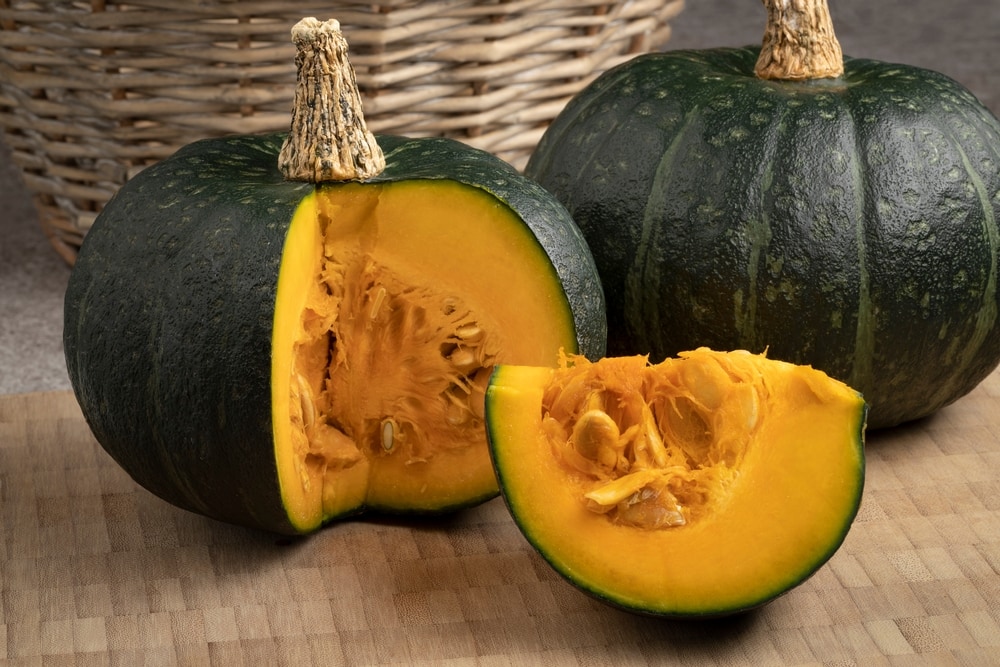Our furry companions often show curiosity about the foods we eat, especially during mealtime. While dogs can consume a variety of meats, fruits, and vegetables, there may be some confusion regarding the safety of certain foods, such as kabocha squash, or Japanese pumpkin.
What is Kabocha Squash?
Kabocha squash, also known as Japanese pumpkin, is a winter squash variety that originated in Japan. Its unique characteristics include dark green, bumpy skin and vibrant orange flesh. Known for its rich, sweet flavor and creamy texture, kabocha squash is not only delicious but also packed with essential nutrients.
Benefits of Feeding Kabocha Squash to Dogs
Vitamins
Kabocha squash is a great source of vitamins A and C, which contribute to vision, immune function, and skin health. Vitamin C also acts as an antioxidant, protecting cells against damage.
Minerals
This squash variety contains essential minerals like potassium and calcium, which play a vital role in regulating blood pressure, maintaining bone health, and supporting muscle function.
Fiber
Rich in dietary fiber, kabocha squash promotes healthy digestion and may assist with weight management for dogs. It can help alleviate issues like diarrhea and constipation, reducing the likelihood of these problems occurring.
Low in Calories
Kabocha squash is relatively low in calories, making it an excellent addition to your dog’s diet in moderation.
Potential Issues of Feeding Kabocha Squash to Dogs
Digestive Issues
Some dogs may have sensitive stomachs and experience digestive upset when introduced to new foods. To mitigate this, start with small portions and monitor your dog for any adverse reactions.
Allergies
Dogs can develop allergies or intolerances to various foods, including squash. If you notice signs of an allergic reaction, such as itching, hives, or gastrointestinal distress, discontinue feeding kabocha squash and consult your veterinarian.
Portion Control
Although nutritious, kabocha squash should only constitute a small portion of your dog’s diet. The bulk of their nutrition should come from high-quality commercial dog food, preferably with real meat listed as the first ingredient.
Serving Kabocha Squash to Dogs
For dogs, the majority of their nutrients should come from a complete and balanced commercial dog food. Treats, including kabocha squash, should not exceed 10% of a dog’s daily caloric intake. Here are some serving suggestions:
Steamed Kabocha Squash
- Cut the squash into small, bite-sized pieces, removing the seeds and skin.
- Steam the pieces until they are soft and can be easily mashed with a fork.
- Allow the squash to cool before serving.
Boiled Kabocha Squash
- Similar to steaming, you can boil kabocha squash until it is soft.
- Let it cool before offering it to your dog, ensuring there are no seeds or skin.
Mashed Kabocha Squash
- Mash steamed or boiled kabocha squash and mix it with your dog’s food for added flavor and nutrients.
- This method can be particularly helpful if your pet needs to take medication.
Kabocha Squash Treats
- Create homemade kabocha treats by combining mashed squash with whole wheat flour and water until a dough forms.
- Shape the dough into small treats and bake them until crisp.
Frequently Asked Questions (FAQ)
Can I Give Raw Kabocha Squash to My Dog?
Feeding raw kabocha squash to dogs is generally not recommended due to digestion difficulties and potential choking hazards.
How Much Kabocha Squash Can I Feed My Dog?
The amount of kabocha squash you can feed your dog depends on their size and dietary needs. Begin with smaller portions and consult your veterinarian for personalized recommendations.
Is Canned Kabocha Squash Safe for Dogs?
Canned kabocha squash is generally safe for dogs as long as it does not contain added sugars, salt, or other seasonings. Always check the label for any harmful ingredients.
Can Kabocha Squash Help with Digestive Issues in Dogs?
The dietary fiber in kabocha squash can aid digestion and regulate bowel movements, potentially offering relief for dogs with mild digestive issues. However, it is essential to consult your veterinarian for appropriate treatment options if your pet experiences these issues.
Can I Feed Other Fruits and Vegetables to My Dog?
Many fruits and vegetables are safe and beneficial for dogs, including carrots, sweet potatoes, green beans, and apples. Before introducing any new food, it is crucial to research its safety, consult your vet, and gradually incorporate it into your dog’s diet.
Conclusion
Kabocha squash can be a healthy treat for dogs, offering numerous vitamins, minerals, and fiber that promote overall well-being. However, some dogs may experience digestive issues or allergies, so it’s important to monitor them closely after consumption. A proper serving involves removing the skin and seeds, and either steaming or boiling the squash without any seasoning. Always consult your veterinarian before introducing new foods to your dog’s diet to ensure their safety and proper portioning.
